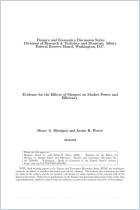Rejoignez getAbstract pour lire le résumé !

Rejoignez getAbstract pour lire le résumé !
Giulio Federico, Gregor Langus and Tommaso Valletti
A Simple Model of Mergers and Innovation
CESifo Group Munich, 2017
Aperçu
The news on mergers and their effects on innovation is not promising.
Recommendation
The worldwide corporate buzzword is “innovation.” Firms looking to drive their creative capacities can pursue organic avenues, or alternatively, consider mergers and acquisitions to spur productivity. But the M&A path to innovation may not be the panacea that business leaders anticipate. Economists Giulio Federico, Gregor Langus and Tommaso Valletti employ various models to determine the overall efficacy of corporate combinations on innovation. getAbstract suggests this technically rigorous report to economists, analysts and policy experts.
Summary
About the Authors
Giulio Federico and Gregor Langus are economists at the European Commission in Brussels. Tommaso Valletti is an economics professor at Imperial College Business School, London.






















Comment on this summary